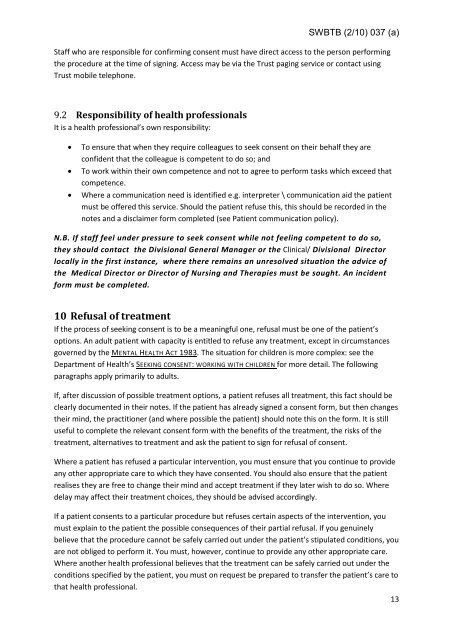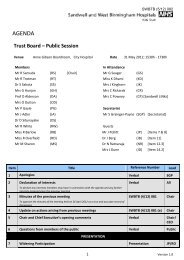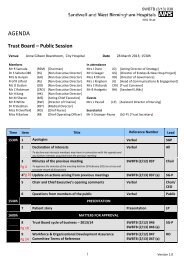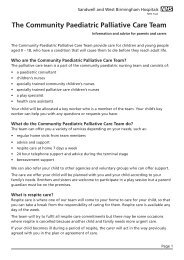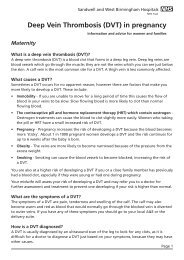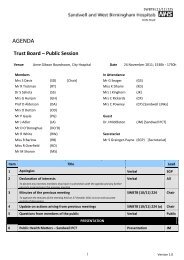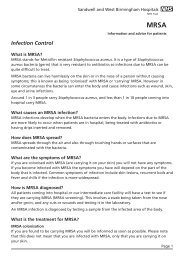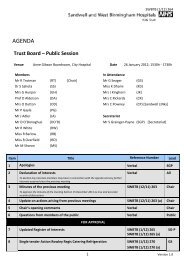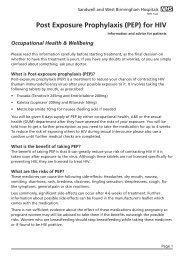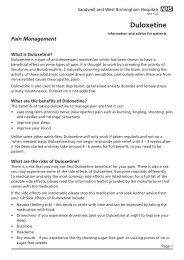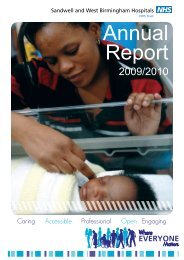Trust Board Febuary 2010 - Sandwell & West Birmingham Hospitals
Trust Board Febuary 2010 - Sandwell & West Birmingham Hospitals
Trust Board Febuary 2010 - Sandwell & West Birmingham Hospitals
You also want an ePaper? Increase the reach of your titles
YUMPU automatically turns print PDFs into web optimized ePapers that Google loves.
SWBTB (2/10) 037 (a)<br />
Staff who are responsible for confirming consent must have direct access to the person performing<br />
the procedure at the time of signing. Access may be via the <strong>Trust</strong> paging service or contact using<br />
<strong>Trust</strong> mobile telephone.<br />
9.2 Responsibility of health professionals<br />
It is a health professional’s own responsibility:<br />
• To ensure that when they require colleagues to seek consent on their behalf they are<br />
confident that the colleague is competent to do so; and<br />
• To work within their own competence and not to agree to perform tasks which exceed that<br />
competence.<br />
• Where a communication need is identified e.g. interpreter \ communication aid the patient<br />
must be offered this service. Should the patient refuse this, this should be recorded in the<br />
notes and a disclaimer form completed (see Patient communication policy).<br />
N.B. If staff feel under pressure to seek consent while not feeling competent to do so,<br />
they should contact the Divisional General Manager or the Clinical/ Divisional Director<br />
locally in the first instance, where there remains an unresolved situation the advice of<br />
the Medical Director or Director of Nursing and Therapies must be sought. An incident<br />
form must be completed.<br />
10 Refusal of treatment<br />
If the process of seeking consent is to be a meaningful one, refusal must be one of the patient’s<br />
options. An adult patient with capacity is entitled to refuse any treatment, except in circumstances<br />
governed by the MENTAL HEALTH ACT 1983. The situation for children is more complex: see the<br />
Department of Health’s SEEKING CONSENT: WORKING WITH CHILDREN for more detail. The following<br />
paragraphs apply primarily to adults.<br />
If, after discussion of possible treatment options, a patient refuses all treatment, this fact should be<br />
clearly documented in their notes. If the patient has already signed a consent form, but then changes<br />
their mind, the practitioner (and where possible the patient) should note this on the form. It is still<br />
useful to complete the relevant consent form with the benefits of the treatment, the risks of the<br />
treatment, alternatives to treatment and ask the patient to sign for refusal of consent.<br />
Where a patient has refused a particular intervention, you must ensure that you continue to provide<br />
any other appropriate care to which they have consented. You should also ensure that the patient<br />
realises they are free to change their mind and accept treatment if they later wish to do so. Where<br />
delay may affect their treatment choices, they should be advised accordingly.<br />
If a patient consents to a particular procedure but refuses certain aspects of the intervention, you<br />
must explain to the patient the possible consequences of their partial refusal. If you genuinely<br />
believe that the procedure cannot be safely carried out under the patient’s stipulated conditions, you<br />
are not obliged to perform it. You must, however, continue to provide any other appropriate care.<br />
Where another health professional believes that the treatment can be safely carried out under the<br />
conditions specified by the patient, you must on request be prepared to transfer the patient’s care to<br />
that health professional.<br />
13


